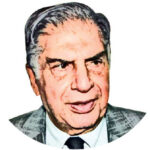WHEN we are confronted with the evidence in any matter, for example a personal or a political issue, the cognitive process in our brain is immediately activated. But surprisingly, the neural circuits in the brain that are normally involved in reasoning or logic do not participate in this process. In fact, when the brain arrives at a certain conclusion which makes us emotionally comfortable, we get the rewards in terms of joy or pleasure and get massively stuck to that conclusion as our own view. This is the finding of a scientific study reported in the Scientific American recently.
Perhaps this hypothesis explains the obdurate extreme views some of my senior colleagues hold concerning the dress, gait or stubble of the Prime Minister. These worthy gentlemen leave no opportunity to berate the decision of the Prime Minister to replace high denomination currency. They see no merit whatsoever in the original idea aimed at exposing black money stocked by a large number of people.
‘We need to focus on people’s woes,’ says one of them, ‘disappointed that many of us have remained silent on that course or dismissing it as temporary inconvenience; what’s more permanent than death?’
The other joins in, ‘verily it can be said that we have been castrated’; ‘the government owes an explanation to the people of India for their enormous bungle’.
Another passes the judgment, ‘it is a self imposed crisis for political benefit’. And the whole debate is put to rest by yet another, ‘Demonetisation has been an unmitigated disaster, which has hit the poor and middle class very hard. It has actually opened new avenues of corruption. It can only be supported by admirers of you know who’. Period.
Surprisingly, these otherwise perfectly rational individuals do not belong to any political party. They belong to the highest brand of the civil service and are expected to be discerning, non-partisan and objective. They have in the past adorned positions of great responsibility in the government and have carried several critical operations to successful resolution with their wise counsel. Still, they seem to be genetically averse to anything Modi says or does.
Despite entreaties from their peers to moderate their severely stubborn views in the interest of a more informed debate, they keep screaming ‘murder of the Constitution’ and ‘deathblow to democracy’. Perhaps they would be well advised to recycle their emotionally comforting judgments through their reasoning neutrons.
In my view, the tardy pace of replacement of currency notes, collusive acts of sundry bank officials with criminal elements for funneling out new currency, avoidable adverse effect on millions of small entrepreneurs and traders, and suffering of almost every citizen in trying to withdraw his own money from the bank are real problems in effective implementation of the decision to delegitimise old Rs. 1000 and Rs. 500 currency bills. Having worked in the government for a long time, I am also aware that the challenge could have been met satisfactorily by astute planning and efficient management; and, therefore, to an extent everyone involved in making the decision of demonetisation and its implementation is to be held responsible.
BUT by refusing to engage with ‘admirers of you know who’ constructively, in my view, these liberal intellectuals are losing their plot owing to their strident obduracy.
Of course, the government has taken an uncertain step in an unchartered direction. The initial avowed purpose of blocking black wealth did not prove successful. A few much graver challenges are also lurking in the shadows if the government fails to put its house in order. Reestablishing faith in the currency and restoring the credibility of State institutions are going to be tested in coming weeks and months. Perhaps for the first time in its history, fingers are being raised on the functioning of the Reserve Bank of India.
In my view, the three tests of success or otherwise of the move of demonetisation would be peoples’ reaction to it, the result of UP elections and the widening of tax base within a reasonable period. Of these, the first has already been successfully passed by the government as there has not been much public disturbance or violence despite obvious inconvenience to millions.
However, the jury is still out and it is perhaps a little too early to deliver the final verdict.
Endpoint: Should I too re-evaluate my strongly held views by routing them through reasoning neurons and risk getting emotionally disturbed?
The writer was the Cabinet Secretary and the first Governor of Jharkhand. He can be reached at pkumar1511@hotmail.com
Prabhat Kumar is an Indian Administrative Service officer of the 1963 batch, he served as the Cabinet Secretary of Government of India between 1998 and 2000. Upon creation of the State of Jharkhand in November 2000, he served as the first Governor.

















































